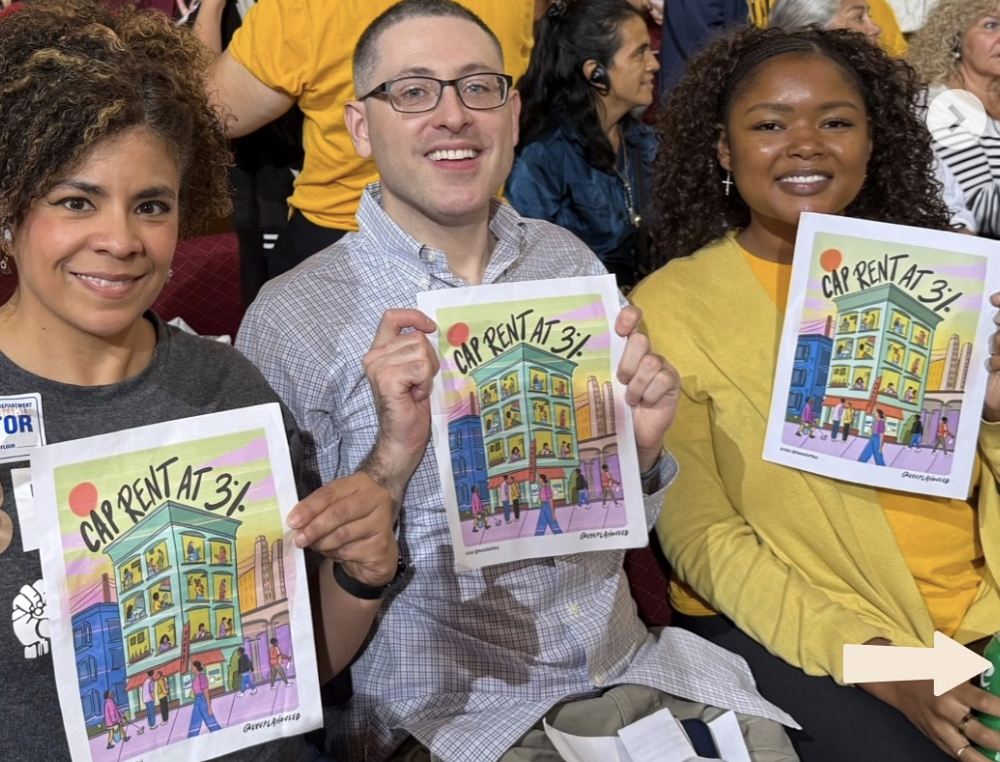Guest article by Malcolm L. Ray, West LA Sawtelle Neighborhood Council Board Member
On Wednesday afternoon, I stood in line at Los Angeles City Hall with dozens of other tenants, organizers, and community members, waiting for the chance to speak at the Housing and Homelessness Committee hearing. The committee was set to discuss a range of critical housing justice issues: long-overdue reforms to the city’s Rent Stabilization Ordinance (LARSO), the future of the Venice Dell affordable housing project, and a proposal to require cooling measures in older rental buildings where summer indoor temperatures often exceed livable conditions.
I arrived at 12:30 p.m. to make sure I could get inside. Only 100 people were allowed in, and hundreds more would ultimately be turned away. I passed the time with fellow advocates, including Jillian Burgos—a staffer at LA Forward, board member of the North Hollywood Neighborhood Council, and former City Council District 2 candidate—as well as organizers, activists, and union members from across the city. Among the people I spoke with was Miracle McKinney, who has served on the Empowerment Congress West Area Neighborhood Development Council for two years. As someone who was just elected to my own neighborhood council, I appreciated her insight and perspective as we waited together.
The hearing opened with Councilmember Traci Park, my councilmember, delivering a roughly nine-minute prepared statement. Park isn’t on the committee—which is chaired by CD-4 councilmember Nithya Raman—but attended to advocate for her proposal to shift attention from the long-approved Venice Dell affordable housing project (Lot 731) to another nearby city-owned parking lot (Lot 701). She framed the alternative site as a potential “transit hub” that would also maintain parking, claiming this was what the neighborhood really needs.
Park’s comments were packed with inaccuracies. Venice Dell already includes plans for underground parking—a concession to neighbors concerned about street parking. And anyone who has spent time in that area, as I have, knows that the existing lot is barely used. One organizer told me that Lot 701 isn’t even a viable housing site. Park’s new proposal isn’t a good-faith alternative; it’s a political maneuver designed to stall or kill Venice Dell altogether. Yet Park spoke at length as if she were the champion of tenants and housing. If you didn’t know the issue, you might believe her.
Meanwhile, tenant and progressive organizations like ACCE, SAJE, LA Forward, DSA-LA, and unions like UTLA had mobilized more than 250 people to attend. The city cut the usual two hours of public comment down to one, and many never made it inside. Those who did included community members, some speaking in Spanish with live translation, sharing deeply personal stories of the crushing weight of rising rents.
Rae Huang, a pastor and senior organizer at Housing Now, quoted a woman she met at the demonstration outside City Hall—one of the many who couldn’t get in. The woman, a pupusa vendor, has rented the same apartment for 34 years. She started at $400 per month. Every year her rent increased by 4–6%. She now pays $2,300. “Please do the right thing,” Rae urged the committee. “We are watching across the state.”
By luck and promptness, I secured one of the limited speaking slots. When my turn came, I spoke about my support for Councilmember Nithya Raman’s proposal to reform the LARSO formula by capping annual rent increases at 3% and eliminating utility bumps. I also spoke about Venice Dell. I live in Sawtelle, where numerous ED1 projects are already underway. I stressed that different parts of our district are being asked to shoulder different housing responsibilities, and equity and fairness must guide the city’s approach. Venice Dell is fully funded, shovel-ready, and approved twice by the City Council. It’s time to build.
Also present was Faizah Malik, an attorney at Public Counsel and one of the lawyers suing the city to move Venice Dell forward. She is also running against Park in the election next year to represent CD-11. Her colleague Carie Martin put it well afterward, noting that “the issues heard before the Housing and Homelessness Committee affect us all—from who can afford to live and work in Los Angeles, to the right to healthy, habitable housing regardless of income or life circumstance.” Martin also highlighted the role of the Keep LA Housed coalition, which is pushing for stronger rent protections and more affordable housing citywide.
A landlord lobbyist also spoke, arguing that reforming LARSO would cut into profits and discourage new construction—an absurd claim, given that LARSO applies only to buildings built before 1980. His comments, like Park’s, were a reminder of how easily misleading narratives can dominate if tenants and advocates don’t show up.
Park left the room before I spoke. But that’s okay. My remarks are now part of the record, alongside those of hundreds of Angelenos who took time off work, navigated security, and waited in long lines to be heard.
City Hall can feel like an insider’s game. But Wednesday was also a reminder that collective pressure matters. Tenant organizations mobilized hundreds of people that day. If Los Angeles is going to be a city where working people can live and thrive, then it’s on all of us to keep showing up—and to make sure our elected leaders hear us, whether they stay in the room or not.

